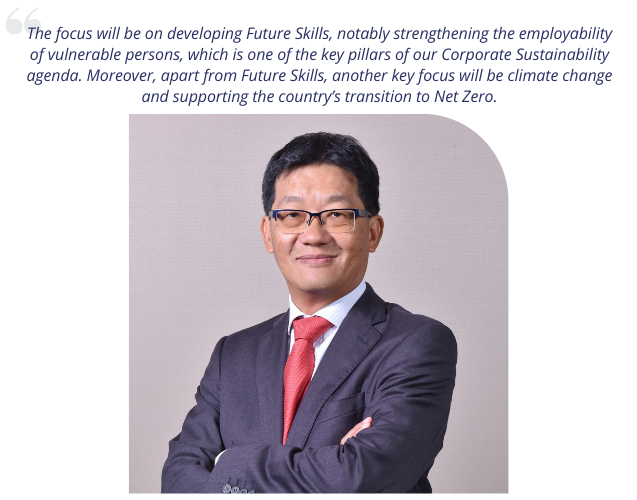Dean Lam, Managing Director for HSBC Mauritius, shares his views on how the country’s exit from the EU blacklist, following the FATF greylist, underscores the island economy’s commitment towards enhancing its regulatory regimes to global standards – and how HSBC has been able to support the island economy’s growth by closely collaborating with other locations for flawlessly executing complex deals.
For the way forward, he notes that the global bank is focusing on developing Future Skills in Mauritius, forging ahead with the climate change agenda, and supporting the country’s transition to Net Zero.

How is HSBC Mauritius poised to leverage the new uptick in investor sentiment around the island economy, with Mauritius successfully exiting the EU blacklist - following the FATF greylist - in a major achievement on the AML/CFT front?
The EU has confirmed that Mauritius has been removed from the list of high-risk third countries by February 2022. At HSBC, we welcome this milestone and believe it further validates a series of bold and in-depth measures adopted by the jurisdiction to enhance its regulatory regimes to global standards. We are confident that these developments will help in boosting investor confidence in using Mauritius as their preferred International Financial Centre for their global transactions. Fortunately, at HSBC we have still been able to grow the cross border international businesses over the past two years during the pandemic by attracting our global clients investing in the region.
With multi-party deals being structured out of HSBC Mauritius, such as the PlaySimple acquisition, and the capital financing needs of large, landmark transactions such as FTPT’s MUR5 billion raise being met out of the island, could you tell us more about how HSBC is able to execute such complex transactions with both its global footprint and the local expertise at its command?
As an International Bank, with clients across 6 continents from 39 countries, we take pride in being able to leverage our global footprint and our global expertise to support the growth of our clients. We encourage collaboration between our team in Mauritius and other markets, to successfully complete those complex deals for our customers. The two deals which you mentioned above, are a reflection of our successful collaboration between teams in various jurisdictions promoting Mauritius as an International Financial Centre. In other words, HSBC aims to open up a world of opportunity for our customers wherever they are and these two examples are living up to this brand promise.
Also, it is worth noting that HSBC Mauritius has been voted Market Leader, Best Trade Finance Bank & Best Service Provider in Euromoney’s 2020/2021 Trade Finance survey. Additionally, we were named Best Domestic Cash Manager and Best in Overall Service in Cash Management, consecutively between 2018-2021, by Euromoney.
Could you elaborate upon the digital transformation initiatives – real-time transfer for corporate clients via IPS, e-signature roll-out across the group, making online shopping safer for clients, and other such exciting developments – that HSBC Mauritius is undertaking in the new normal?
One of the pillars of HSBC’s Group Strategy is to Digitise at Scale, and understandably, every market in which we operate is undergoing its own digital transformation - with some more advanced than others. However, it would be fair to say that in many a case this transformation has been accelerated by the pandemic. With investment in the upgrade of our core banking system last year, we are continuing to digitise at scale; consolidating the e-penetration among clients for payments, which is now at 97%. We are improving trade transactions through HSBCnet from 70% to 80% this year, and growing the penetration of Evolve for FX deals to above 50%.
The IPS system is another great addition to support local payments 24/7 and within seconds. As a responsible bank we are doing away with paper in a bid to support another key pillar of our strategy which is our transition to a net zero carbon economy. In our quest for making banking faster and simpler for our customers, we have also successfully launched the electronic signature.
HSBC LiveSign, powered by Adobe, is a cloud-based service that replaces the paper and ink signature process with a fully automated electronic signature workflow. With LiveSign, customers can easily sign documents anywhere, anytime, and on any device. Once the signing process is complete, LiveSign provides the customer with a copy of the signed document as well as an audit trail of the signing events, for their records. Through LiveSign, the process of signing and returning is reliable and secure.
We will constantly invest in technology because we want to enhance the experience by making our customers’ journey as engaging, seamless, and streamlined as possible. In short, HSBC aims to be at the forefront of providing digital solutions to our clients while reducing manual transactions and operations to the strict minimum.
Recent research published by HSBC and BCG notes that up to half of the estimated $100trn investment needed to deliver net zero supply chains will have to be directed towards SMEs – highlighting the need for a new front in the battle to combat climate change. How does HSBC Mauritius plan to contribute to this noble endeavour at a group level?
In October 2020, HSBC Group set out its ambition to reduce emissions in its operations and supply chain to net zero by 2030, and to align the bank’s financed emissions at clients’ portfolio level to net zero by 2050 or sooner. As such, the HSBC Group expects to provide between US$750bn and US$1trn in financing and investment to support its customers across the world, to progressively decarbonise and help realise the opportunity for long-term, sustainable growth.
Accordingly, we have constantly been enhancing clients’ awareness on Sustainable Business through participation in client sustainable forums, taking a thought leadership role on social media, and supporting our clients to identify and finance their green, climate and sustainable projects. We were delighted to provide financial support to our customer, CIM Financial Services Ltd, on their first Green Funding programme. Similarly, we have supported other customers in the textile and garments sector to green their supply chains through the sourcing of sustainable raw materials. We are looking to support other companies in the automobile sector to bring in more electric vehicles on the market to ensure our transport industry is also moving into more sustainable solutions.
Finally, could you tell us about the CSR initiatives undertaken by the bank - including the residential space of ‘Nou Lakaz’ for children, the water supply system at the Le Morne village and the contribution made to the Agripreneur hub of FarmCity – and how HSBC Mauritius intends to entrench itself more firmly in the local community going forward?
At HSBC, we firmly believe that we have a duty of care to give back to the community in which we live and work. As part of our global Water Programme which ended in 2020, HSBC partnered up with the Lions Club of Quatre Bornes and the CWA, and provided USD500k (about MUR17m) to help alleviate acute water scarcity in Le Morne village, helping hundreds of families.
After the first COVID-19 country lockdown, HSBC became the proud sponsor to the tune of MUR500k of a healthy food entrepreneurship incubator, the “Agripreneur Hub”, by award-winning social enterprise Farmcity. This incubator, based in Bois Rouge, supports local startups in their upskilling journey towards making organic farming products available to as many Mauritians as possible. HSBC sponsored the setting up of an irrigation system and various structures.
As for the Nou Lakaz project by NGO Safire which looks after street children, this was among a series of projects funded over three years in the context of the 150th anniversary of the HSBC Group . “Nou Lakaz” is a halfway home for children with family issues, a semi-residential facility made from reconditioned shipping containers. SAFIRE’s social workers aim to get the beneficiaries ready to integrate into a mainstream institution such as a vocational training centre or a workplace or as placement in an enterprise. Moreover, the residential facility enables stays up to 3 months, with weekend contacts with the beneficiaries’ biological parents. The project was inaugurated on Friday, 27 November, by Bonnie Qiu, CEO of HSBC Mauritius.
In 2022, the focus will be on developing Future Skills, notably strengthening the employability of vulnerable persons, which is one of the key pillars of our Corporate Sustainability agenda. In this regard, we have agreed to fund a Marine Technical School in Black River which will be a country first, and will be launched in Q2 by the ENL Foundation. We will also continue supporting the “Aprann” apprenticeship programme with ENL, which gives concrete and impactful opportunities to vulnerable people, notably young unemployed persons, to reskill and upskill and be ready to join the work force. A special training centre will be launched in Q2. The HSBC Undergraduate Business Case Competition is another area of focus where we are very happy to invest not just money, but also the time of our senior managers. The competition is expanding each year to even more universities. Undergraduate students compete in teams on solving business cases, and presenting their analyses as well as solutions to a panel of senior business managers. The winning Mauritian team represents the country at the finals organised by the regional HSBC Office in Hong Kong, where teams from more than 20 countries participate, including from outside of the Asia-Pacific region, i.e. from the USA, Canada, and France. We are keen to bring this kind of exposure to our young talents in Mauritius, opening up a world of opportunity for them as well.
Moreover, apart from Future Skills, another key focus will be climate change and supporting the country’s transition to Net Zero. We are working with the Universite des Mascareignes on a study to ensure that electric vehicles in Mauritius can be fully charged from solar photovoltaic electricity, so as to be fully green. We are also working with the National Parks & Conservation Service to improve the carbon sequestration capacity of our forests and to restore native ecosystems. Lastly, we are working with the NGO Reef Conservation to integrate in the Eco-Schools programme with the Ministry of Education, a biodiversity programme to help our youths take a strong interest in understanding and protecting our unique ecosystems and natural heritage.
